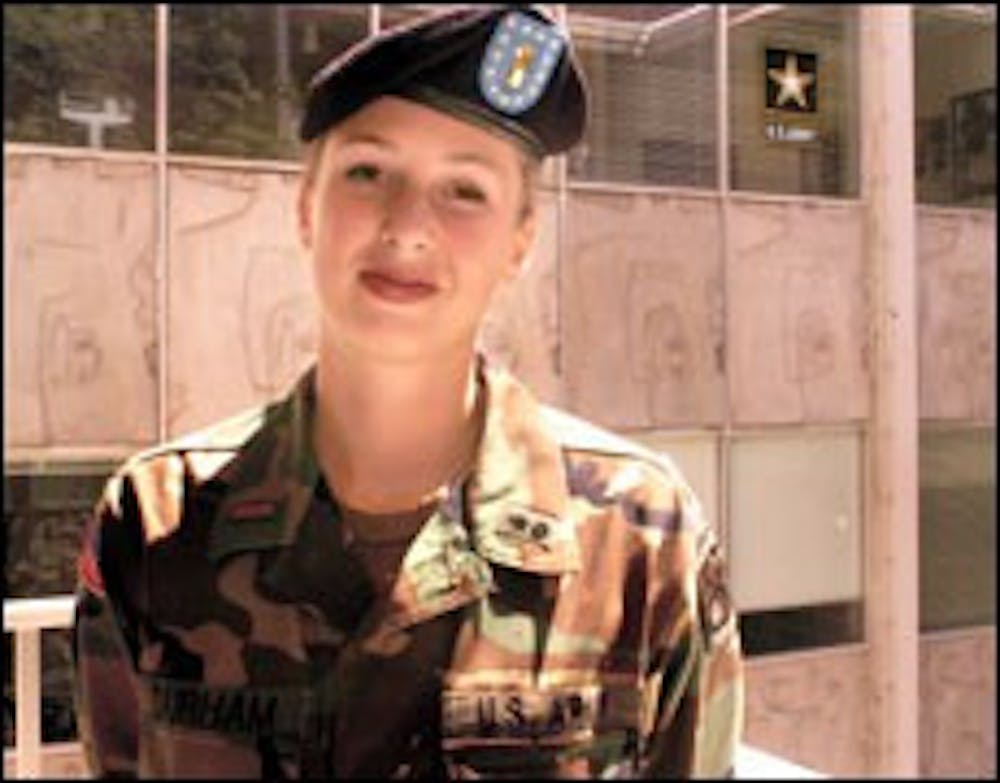Upon graduation, some students move back home to stay with Mom.
Others might take a vacation or debate whether to go to graduate school.
But, newly commissioned 2nd Lt. Amanda Durham of the U.S. Army will be heading to the Aberdeen Proving Grounds in Maryland for the 18-week Officer Basic Course to further prepare for her first assignment in South Korea.
Training for the justice studies graduate will consist of fixing Army vehicles and missiles systems and other weapons necessary in combat operations.
Durham is just one of the 4,000 newly commissioned Army officers to graduate from ROTC programs in colleges around the country. At ASU, she is one of 20 graduates that will be assigned to various types of additional training.
"The Army gives you a chance to travel around the globe and work with a lot of people," said Durham, who graduated in the upper-third of her class. "How many people just go to South Korea to work? You won't get training like this in corporate America."
Durham admits her decision to join the Army ROTC two years ago "flipped out" her family, especially her mother.
"I was not expecting that," Theresa Durham said. "Amanda is very passionate of whatever she undertakes. It took me about a month to come to grips with this, but I've always been supportive of whatever she does. She's always been an individual and had a mind of her own. She's adventurous and has no hesitation."
That lack of hesitation coupled with a strong work ethic she displayed in the ROTC Leadership Training Course and school has impressed her colleagues and commanding officers, who are quick to dispel any notion that her gender could interfere with her ability to perform her duty as an officer.
"She's a very strong leader," said Maj. James Caryl, who has served in Iraq and Afghanistan. "I've never seen anyone question her decisions because she's a woman. She can hold her own. I would go to war with her today."
Ever serious, Durham is well aware of the risks of serving in the armed services, including serving in a war zone. As a second lieutenant, Durham could be required to command a platoon of 15 to 60 soldiers.
"We all know what we're getting into when we signed up," said Durham, dressed immaculately in fatigues and polished black boots. "I'm not afraid to do my job."
When out of battle dress uniform, Durham, who graduated with a 3.8 GPA, enjoys dancing.
"I do waltz, tango, foxtrot, country dancing, ballroom, but my favorite is salsa," she said.
Durham's charm is also coupled with a fierce sense of loyalty and a willingness to help others, said her mother, Theresa.
"She's extremely feminine, but she has this other side to her," she said. "There is nothing she wouldn't do for her family and friends. She is also very willing to lend a helping hand to whoever needs it. It's a beautiful thing about her."
The Army, she added, "has done nothing but positive things for her. It's made her even more disciplined than she already was."
Durham, the daughter of a Vietnam vet, considers military service as a reminder to older Americans, whose views on younger generations can be less than flattering, that young people have drive.
"I think that there's a sad misconception of America's youth," she said. "I believe that the majority of young people want to do good things. I think most people want to do something great."
Nationwide, enrollment in college-level ROTC programs has been rising steadily since 2000. Since then, the number of graduated officers has increased by almost 20 percent. Although the terrorist attacks in 2001 and subsequent events likely have validated the decisions of some, reasons for joining ROTC are different for each individual, said Army Cadet Command spokesman Paul Kotakis.
"There's opportunity to receive financial aid and merit-based scholarships, and the curriculum offers management skills useful not only in military situations," Kotakis said. "You can acquire skills prized by corporate America, and we're also proud of our people in the private sector."
The reporter can be reached at christian.palmer@asu.edu.




